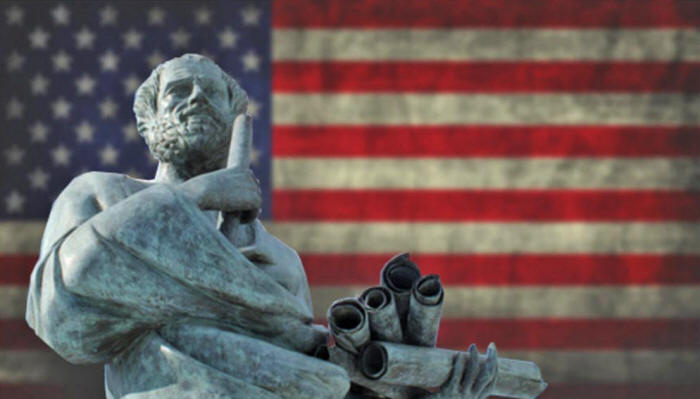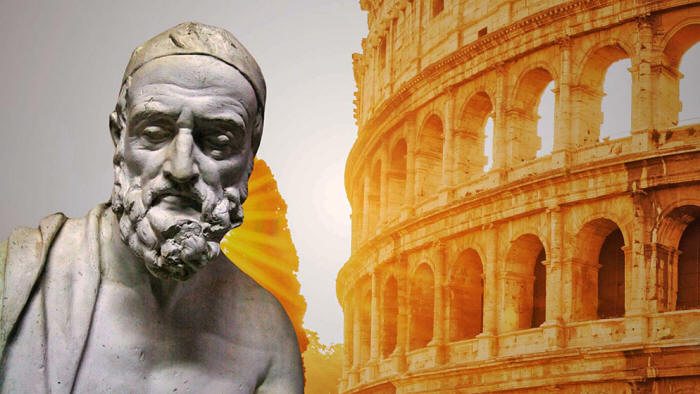|

by Ben Potter
July 02, 2025
from
ClassicalWisdom Website

|
The Fourth of July…
It is an
independence day shared by many, including those in,
-
the Cayman
Islands (who still not-so-independently salute the
queen)
-
Abkhazia (not
quite Russia, not quite Georgia)
-
Northern
Mariana Islands (still part of the American
"commonwealth")
-
Rwanda (gained
independence from Belgium in the 60's)
-
the Philippines
(which has been owned by everyone)
The fifth of July
is for those in Armenia, Algeria, Cape Verde and
Venezuela.
The third for the
good people in Belarus and the United States Virgin
Islands.
I suspect you
already gathered my point...
Not only are there
plentiful "independence" ceremonies in July (I've named
but a few), but many are celebrated in places where the
very state of independence itself is questionable at
best.
Moreover, the concept of a people having a government
that necessarily reflects their actual wishes and
desires is... well... often optimistic.
Many of the above
"countries" are marred with genocides, current or
postcolonial disenfranchisement, or even tragically in
some cases, widespread starvation.
The often convoluted relationship between people and
their government is not something from the dusty past,
nor is it something that only happens "somewhere else."
It's a very real
and very important conversation to be had.
And just because
one state of governance was once stable and reliable is
no guarantee that it will always be so… something the
American founding fathers knew well.
Indeed, it was the
very issue they tried hard to address in the founding
documents.
Moreover, they knew that it is incredibly important, as
a thinking person, to question:
What is
government?
What is
Politics?
And what is the
best political system?
As Aristotle
put it, we are all political animals... so we can not
ignore this crucial part of our own being, no matter
where we are from.
Only by learning about the nature of politics, by being
better educated and more thoughtful (as well as truly
open minded) can we one day hope to be part of the best
political system.
So, leave your party politics behind, delve into the
history of the state, from the Ancients onwards.
This month we've
got it all when it comes to politics, including how the
classical forms of government have influenced the modern
ones,
-
Aristotle's
"ideal" state
-
the
relationship between democracy and tyranny
(according to Plato)
-
the political
role of ostracism
-
last but not
least, the best dictator of the Ancient world...
Anya Leonard
Founder and Project Director
Classical Wisdom |
It's the old joke:
"politics" is derived from two Greek words.
Polis, meaning "the people" and tics...
small creatures that burrow under the skin, suck your blood and
make you sick.
I said it was an old joke, not a good
joke...
Though we are all aware of the vast debt we owe to the Ancients,
when it comes to politics, the ancient world's influence on the
modern world is... well, not unacknowledged, but often slightly
misdirected.
Instinctively, we tend to doff our collective caps to our Greek,
specifically Athenian, forefathers.
This is not without reason:
The idea that ordinary people should have a
say in steering the ship of state is front and center of the
constitutions of every developed country today.
And it was the Athenians who popularized
democracy in the ancient world.
This, combined with the fact that democratic
Athens (roughly 508-322 BC) coincided with the golden age of
Greek literature, architecture, sculpture and philosophy means
that we tend to look upon this era and political system as
particularly enlightened.
As for the rest, it's easy to write off,
...as exercises in statehood offering
little to the modern political world.
But it is here that we make our mistake.
Athens was never really a democracy,
at least in the manner any modern (small 'd') democrat would
stand with.
One reason is because, from the time of the
Macedonian subjugation of Greece (338 BC), Athens was a de facto
democratic client-kingdom that could have had its powers stripped by
the Macedonians at the drop of a hat.
There were also periods of oligarchic rule that
interrupted the democratic idyll - a result of Athenian aggression
and capitulation in the
Peloponnesian Wars against Sparta.
The disastrous policies reinforce Winston Churchill's famous
line:
"the best argument against democracy is a
five-minute conversation with the average voter."
Even when Athens was a fully-fledged democratic
state with undisputed self-determination, it still only fully
enfranchised a fraction of its adult population... notable
exclusions being,
women, the young, the ostracized, those who
hadn't completed their military service and, of course, millions
of slaves...
If we chose to ignore the fact that only a
fraction of Athenian homo sapiens could actually cast a vote,
the democratic process would still be anathema to modern
political thought, because the "one man, one vote" system meant
that every piece of Athenian legislation was, effectively a
referendum.
An appealing thought... except to those who
have participated in a referendum...!
The reality is,
Greek and Roman slavery had a far more
enduring legacy in the construction of the modern, political
world than Athenian democracy ever had.
The idea that ownership of other human beings
was "natural" was so ingrained that even the great, enlightened
Plato
had very few qualms... and
Aristotle positively welcomed it!
But slavery was not, of course, the only political idea planted by
the Ancients.
Plato may have been interested to see that some
of the more radical ideas he posited in his Republic actually came
very near to fruition during the 20th century's
flirtation with communism.
Though numerous communist states have experimented with curtails on
property and possessions, it was in Mao's China that ideas
similar to Plato's about social communism were actually lived out.
This period, though not quite going to Plato's extreme of
dismantling the family unit altogether did,
introduce mass, communal meals, forced people
to ask for permission from their work-unit before they could
marry or conceive a child, regularly forced families to split up
and move to different cities, and punished people for
extramarital affairs with loss of jobs and housing.
Despite all this, much like ideas that Plato put
forward, Mao's China also saw a simultaneous, relative emancipation
of women.
It is reasonable to assume Athenian democracy inspired
other modern democracies -
even if that inspiration was along the lines of,
"yes, we like this, but it doesn't quite work
- what can we do differently?"
It is very unlikely, however, that Greek and
Roman slavery or Plato's communist ideas directly inspired their
modern equivalents.
But isn't there anything from the ancient
political world that has directly influenced the modern?
Well, certainly the Persian idea, adopted by
Alexander the Great and in turn appropriated by Roman Emperors
(among others) that,
a dictator or king rules by some sort of
divine right or is, indeed, himself quasi-divine.
This idea dominated throughout the middle-ages
and endures to this day in North Korea...
Additionally, Seneca's ideas in his On Clemency (De
Clementia) about a more merciful, benevolent form of
dictatorship could be said to have echoes in the premierships of
Mustafa Kemal Ataturk of Turkey and Lee Kuan Yew of
Singapore.
Then there is the government of the United States, whose
formation drew from a number of historical influences.
As America's second president, John Adams, put it:
"I wish to assemble together the opinions and
reasonings of philosophers, politicians, and historians, who
have taken the most extensive views of men and societies, whose
characters are deservedly revered, and whose writings were in
the contemplation of those who framed the American
constitutions.
It will not be contested that all these
characters are united in Polybius."
This Greek-born, Roman resident,
Polybius (200-118 BC) lauded
the tripartite Roman system, claiming it was the key for the
stability and success of the nation.
In Polybius' eyes, by combining,
the three theoretically sound, but easily
corruptible systems of monarchy, aristocracy and democracy,
...Rome became much more than the sum of her
parts as each of these acted as complimentary counterweights to the
others.
But the ideas of checks and balances and a separation of powers is
not all there is to this Roman/U.S. comparison; the direct influence
goes much deeper.

It is easy to see the progression of ideas from Polybius' theory, to
the institutions at Rome, to those of the United States:
-
monarchy = the Roman consuls = the
President
-
aristocracy = the Roman and American
Senates
-
democracy = the Assembly = the House of
Representatives
Obviously there are both major and minor tweaks
to these systems:
Rome had two consuls, America has one
president, the Roman Assembly evolved into a chamber
specifically designed to cater to the lowest, enfranchised
class.
The Roman Senate, meanwhile, was run by a
bunch of privileged, out of touch elitists who were only
interested in maintaining the status quo.
Though this is probably the best and most
widely-understood example of connective tissue between ancient
and modern politics, there's more.
For example,
and I've done my best to avoid him, but
anyone familiar with the divisive, vitriolic, rabble-rousing,
Athenian demagogue
Cleon may see a parallel or
two with talked-about political figures in US politics.
However, I shall leave you with a quote that
probably - hopefully - does not make you think about your local
mayor or governor or presidential candidate.
It is from Herodotus'
Histories:
"The Ethiopians have laws and customs
peculiar to themselves, and the strangest is the method they
have of choosing as their king the man whom they judge to be
tallest, and strong in proportion to his height."
Make the
MVP in the
NBA playoffs king?
Well... it's one way to get kids interested
in politics...!
|



